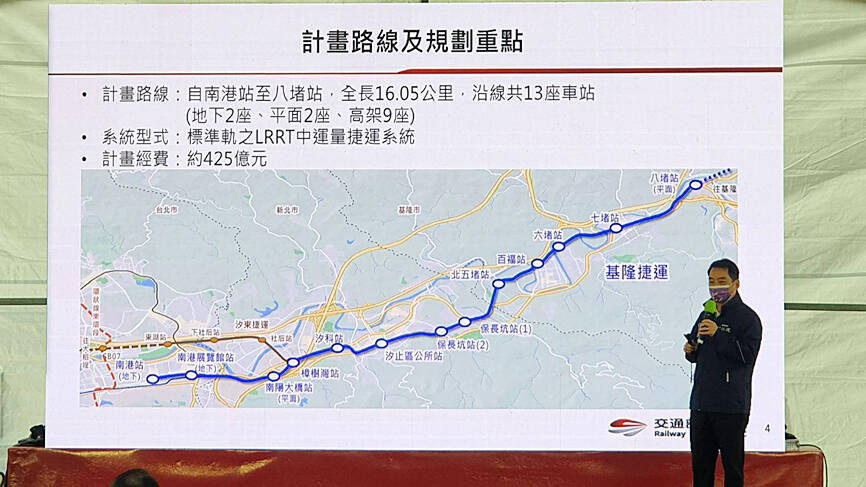The Keelung City Government could avoid a “financial dark period” when building the Keelung MRT line if it focuses on property development along the MRT route, Minister of Transportation and Communications Wang Kwo-tsai (王國材) said yesterday.
The plan to construct a 16.5km MRT line connecting Badu Railway Station in Keelung and Nangang Railway Station in Taipei was finalized during the administration of former Keelung mayor Lin Yu-chang (林右昌), of the Democratic Progressive Party, who now serves as minister of the interior.
Keelung Mayor Hsieh Kuo-liang (謝國樑), of the Chinese Nationalist Party (KMT), said during a live broadcast on Facebook on Sunday that the city must pay NT$5.386 billion (US$176.15 million) toward building the MRT line — three times more than the previous estimate.

Photo: Lu Hsiu-hsien, Taipei Times
That would cause Keelung to plunge into a “dark period” financially, Hsieh said, adding that the central government should pay the full cost.
The Keelung MRT line is expected to cost NT$69.7 billion, NT$51.4 billion of which would be paid by the central government, while the remaining NT$18.3 billion would be paid by the Taipei, Keelung and New Taipei City governments, Wang said.
“The government has a consistent way of dividing the share of construction costs for MRT systems. The Keelung City Government could consider developing properties along the Keelung MRT line, controlling the cost of drafting land from private owners to build the MRT line and focusing on increasing revenue that could be generated through the operation of the line,” he said.
The Railway Bureau said that the current city government was not asked to pay more because of political considerations.
“Construction material costs have risen dramatically in recent years. The city government changed the method of acquiring land to build the MRT line from ‘segment expropriation’ to ‘general expropriation,’ which has also driven up the cost. As the Keelung City Government’s fiscal status has been upgraded from Level 4 to Level 3, the percentage of construction funds paid by the central government has dropped from 86 percent to 84 percent. As such, Keelung’s share of the costs has tripled from NT$1.77 billion to NT$5.386 billion,” the bureau said.

An undersea cable to Penghu County has been severed, the Ministry of Digital Affairs said today, with a Chinese-funded ship suspected of being responsible. It comes just a month after a Chinese ship was suspected of severing an undersea cable north of Keelung Harbor. The National Communications and Cyber Security Center received a report at 3:03am today from Chunghwa Telecom that the No. 3 cable from Taiwan to Penghu was severed 14.7km off the coast of Tainan, the Ministry of Digital Affairs said. The Coast Guard Administration (CGA) upon receiving a report from Chunghwa Telecom began to monitor the Togolese-flagged Hong Tai (宏泰)

EVA Air is prohibiting the use of portable chargers on board all flights starting from Saturday, while China Airlines is advising passengers not to use them, following the lead of South Korean airlines. Current regulations prohibit portable chargers and lithium batteries from check-in luggage and require them to be properly packed in carry-on baggage, EVA Air said. To improve onboard safety, portable chargers and spare lithium batteries would be prohibited from use on all fights starting on Saturday, it said. Passengers are advised to fully charge electronic devices before boarding and use the AC and USB charging outlets at their seat, it said. South

WAR SIMULATION: The developers of the board game ‘2045’ consulted experts and analysts, and made maps based on real-life Chinese People’s Liberation Army exercises To stop invading Chinese forces seizing Taiwan, board gamer Ruth Zhong chooses the nuclear option: Dropping an atomic bomb on Taipei to secure the nation’s freedom and her victory. The Taiwanese board game 2045 is a zero-sum contest of military strategy and individual self-interest that puts players on the front lines of a simulated Chinese attack. Their battlefield game tactics would determine the theoretical future of Taiwan, which in the real world faces the constant threat of a Chinese invasion. “The most interesting part of this game is that you have to make continuous decisions based on the evolving situation,

Actor Lee Wei (李威) was released on bail on Monday after being named as a suspect in the death of a woman whose body was found in the meeting place of a Buddhist group in Taipei’s Daan District (大安) last year, prosecutors said. Lee, 44, was released on NT$300,000 (US$9,148) bail, while his wife, surnamed Chien (簡), was released on NT$150,000 bail after both were summoned to give statements regarding the woman’s death. The home of Lee, who has retreated from the entertainment business in the past few years, was also searched by prosecutors and police earlier on Monday. Lee was questioned three